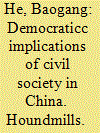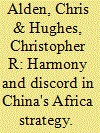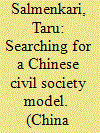| Srl | Item |
| 1 |
ID:
006912


|
|
|
|
|
| Publication |
Houndmills, Macmillan, 1997.
|
| Description |
xi,212p.
|
| Standard Number |
033373670
|
|
|
|
|
|
|
|
|
|
|
|
Copies: C:1/I:0,R:0,Q:0
Circulation
| Accession# | Call# | Current Location | Status | Policy | Location |
| 038823 | 322.440951/HE 038823 | Main | On Shelf | General | |
|
|
|
|
| 2 |
ID:
095344


|
|
|
|
|
| Publication |
2010.
|
| Summary/Abstract |
This article examines the challenges faced by Beijing in managing this increasingly complex relationship, reflecting upon the structural factors that encourage harmony and introduce discord in China-Africa ties. It examines how various policy solutions being considered by China, ranging from increasing participants in the policy-making process to tentative engagement with international development regimes, may still not address the most difficult issues involving adverse reactions to the Chinese presence from African civil societies and political opposition groups. In particular the lack of a strong civil society inside China inhibits the ability of its policy makers to draw on the expertise of the kind of independent pressure groups and NGOs that are available to traditional donor/investor states. The article concludes by asking how the Chinese system can make up for these weaknesses without moving further towards the existing models and practices of the developed countries.
|
|
|
|
|
|
|
|
|
|
|
|
|
|
|
|
| 3 |
ID:
049543


|
|
|
|
|
| Publication |
Oxford, Oxford University Press, 1996.
|
| Description |
vii, 231p.
|
| Series |
Studies in contemporary China
|
| Standard Number |
0198289316
|
|
|
|
|
|
|
|
|
|
|
|
Copies: C:1/I:0,R:0,Q:0
Circulation
| Accession# | Call# | Current Location | Status | Policy | Location |
| 038636 | 323.0951/HOO 038636 | Main | On Shelf | General | |
|
|
|
|
| 4 |
ID:
129914


|
|
|
|
|
| Publication |
New York, Routledge, 2006.
|
| Description |
xxii, 365p.Pbk
|
| Standard Number |
9780415535885
|
|
|
|
|
|
|
|
|
|
|
|
Copies: C:1/I:0,R:0,Q:0
Circulation
| Accession# | Call# | Current Location | Status | Policy | Location |
| 057713 | 303.48330951/TAI 057713 | Main | On Shelf | General | |
|
|
|
|
| 5 |
ID:
092476


|
|
|
| 6 |
ID:
066427


|
|
|
|
|
| Publication |
London, Routledge, 2006.
|
| Description |
xiv, 241p.
|
| Series |
Routledge contemporary China series
|
| Standard Number |
0415369193
|
|
|
|
|
|
|
|
|
|
|
|
Copies: C:1/I:0,R:0,Q:0
Circulation
| Accession# | Call# | Current Location | Status | Policy | Location |
| 050270 | 361.770951/MA 050270 | Main | On Shelf | General | |
|
|
|
|
| 7 |
ID:
085319


|
|
|
|
|
| Publication |
2008.
|
| Summary/Abstract |
This study hypothesizes that the Chinese state uses NGOs as objects of consultation for improving its policymaking in the same way it consults mass organizations, democratic parties, and official professional associations to obtain specialist information. This model of consultation is based on the mass-line model and on its application within democratic centralist administrative hierarchies. The investigation shows that, apart from their main social or environmental tasks, Chinese NGOs indeed inform the state, many of them with policy formulation in mind. It also shows that the Chinese state uses democratic centralist vocabulary to describe the tasks that it assumes NGOs should undertake. However, apart from the mass-line type of consultation, both NGOs and the state have other conceptions about the proper roles for NGOs. The state now promotes the idea of civil society as an independent service provider, while NGOs seek an even larger sphere of social autonomy and self-organization.
|
|
|
|
|
|
|
|
|
|
|
|
|
|
|
|